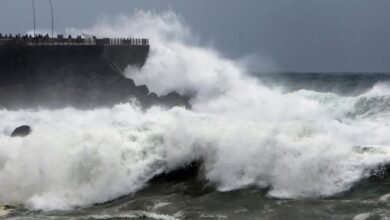Escazú Agreement and Other Environmental Challenges in Latin America in 2023
Adaptation to climate change, halting deforestation, protection of environmental leaders, implementation of the Escazú Agreement, and combating phenomena such as illegal mining and contamination of bodies of water are some of the challenges for Latin America for this year

Photo: Wikimedia-Gafotos
LatinAmerican Post | Julián Andrés Pastrana Cuéllar
Escucha este artículo
Leer en español: Acuerdo de Escazú y otros retos ambientales en Latinoamérica en 2023
There are several environmental challenges that Latin America will have to face in this 2023 that has just begun. Next, we will review some of these challenges, which it is hoped can be overcome with the joint work of the governments, NGOs and civil society of each of the countries that make up this vast region.
Green Economy and Mitigation of Environmental Destruction in the Mining Arc in Venezuela
According to the environmental research portal Mongabay, the efforts that the Venezuelan executive must undertake in environmental matters should aim at a greener economy and actions to mitigate the harmful effects of torrential rains. In fact, the president of this country, Nicolás Maduro, asked COP27 for the approval of a fund to finance climate losses and damages. However, according to the opinion of experts, in order to access these resources, in the first place, Venezuela would have to diversify an economy heavily dependent on the oil industry.
Another of the main obstacles facing the protection of the environment in the Bolivarian nation is the lack of rigorous data and statistics on the effects of extractivism in the Orinoco Mining Arc and oil spills, a fact that would demonstrate the disinterest of the Maduro government on these topics. In this regard, El País of Spain points out in a report that it has been five years since the Venezuelan executive authorized the extraction of different types of minerals in this region, which represents 12% of the national territory. An activity that has left profits whose management is described by this medium as not very transparent. This mining boom has been accompanied by phenomena of labor and sexual exploitation; arrival of Colombian organizations outside the law and negative environmental impact.
Adaptation to the Climate Crisis in Argentina
In the midst of an election year, the Argentine government is preparing to promote a Climate Change Mitigation and Adaptation Plan that includes around 250 measures, among which are the conservation of biodiversity; the transition in terms of energy, production and mobility; as well as the management of forests, waste and urban infrastructures. Some urgent measures to be implemented if one considers that Argentina is already quite vulnerable to the climate crisis, as evidenced by the three years of drought and heat waves that have affected this nation.
Chile's Leadership in Environmental Matters
Among the challenges that Chile will have to overcome in environmental matters for the coming year is the reform of the environmental impact assessment service. Currently, it is the companies that own the evaluated projects that present the environmental impact studies and declarations. To put an end to this conflict of interest, it is proposed that these companies pay independent consultants for said studies and impact statements, in such a way that there is much more transparency. Experts point out that this strategy will work to the extent that there is a registry of accredited consultants who are randomly entrusted with carrying out a study in order to prevent companies from choosing who they hire.
On the other hand, the government of Gabriel Boric aspires to become an environmental leader in Latin America by holding the first meeting of the region's agriculture and environment ministers. Viña del Mar will host this summit on April 3, around which the reduction of carbon dioxide and methane emissions in the agri-food and waste fields will be discussed, according to a statement from the Chilean Ministry of Agriculture in a press release .
The Fight Against Illegal Mining in Peru
In the midst of the convulsive political and social crisis in which Peru is plunged, said Andean nation has several pending challenges to face in this 2023, as reported by the Mongabay portal. One of them is the brake on deforestation in the Amazon due to illegal mining, timber trafficking, coca cultivation and the conversion of jungle into cultivation areas. Regarding illegal mining, regional leaders such as the Governor of Ucayali, Manuel Gambini Rupay, are accused of being actors that influence the strengthening of this harmful practice.
We recommend you read: What happens with the smuggling of wood in the Amazon countries?
Colombian Challenges
Regarding the challenges that Colombia will have to face in environmental matters,the WWF mentions some of special importance in the course of this year. One of them is the implementation of the Kunming-Montreal Agreement, which seeks to counteract the loss of biodiversity through the conservation of 30% of terrestrial and ocean waters, as well as 30% of degraded freshwater ecosystems, marine and terrestrial.
Colombia also has pending, according to the WWF analysis, to protect its freshwater environments, considering that the country has 44% of the páramos of South America, 30 large rivers, thousands of lagoons and swamps that make it a nation amphibian. The fight against deforestation in the Amazon is also on the agenda of President Gustavo Petro.
But without a doubt, the most critical aspect that the newly inaugurated Colombian president will have to manage is that of the energy transition, which is, in fact, one of his campaign flags. This initiative has been surrounded by great controversy, because, although everyone agrees on the urgency of moving towards clean energy, uncertainty has also been generated by the executive's confusing announcements about continuing or not with hydrocarbon exploration. Likewise, there has been a lack of clarity about whether Colombia's current oil and gas reserves are sufficient to carry out an orderly energy transition that does not put the country's economy at risk.
Finally, the implementation of the Escazú Agreement is another pending challenge for Colombia and the region. In the future, it is necessary to bet that the investigations of the environmental technical institutes are accessible to the most vulnerable populations, at the same time that the protection of environmental defenders, local communities and indigenous communities is improved.




